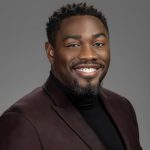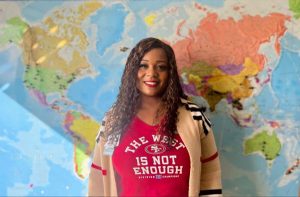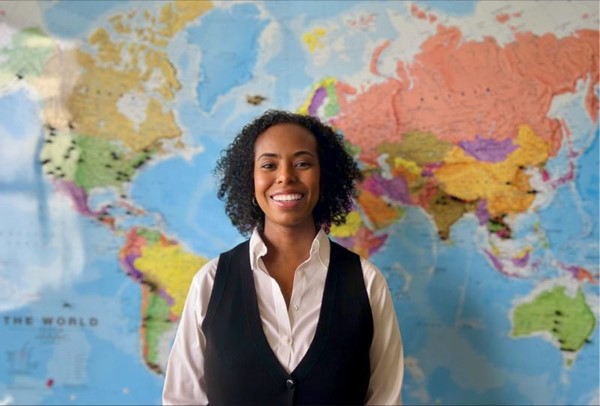 By Tosan O. Boyo, president, Sutter Health Greater East Bay Market
By Tosan O. Boyo, president, Sutter Health Greater East Bay Market
In honor of Black History Month, Vitals editors are pleased to share a series of blog posts by Tosan O. Boyo, president of Sutter Health’s Greater East Bay Market, in which he interviews Black healthcare providers on how and why they’re working to change healthcare.
Tinebeta Mekonnen
Tinebeta Mekonnen is a Physician Assistant practicing Family Medicine at Sutter Health’s Albany Ambulatory Center. Mekonnen is also the center’s Health Equity champion, working to ensure each patient achieves their optimal health..
Q: Describe the moment you realized you’d be dedicating your life to healthcare.
A: As a teenager, I accompanied my Ethiopian immigrant grandmother to her medical appointments. She faced numerous language and cultural barriers, highlighting the pressing need for more inclusive and compassionate healthcare experiences. Witnessing the challenges she encountered ignited a passion within me to serve as an advocate, dedicated to bridging the gaps in healthcare for marginalized communities.

Tinebeta Mekonnen, PA, Sutter Health Albany Ambulatory Center
Q: What healthcare problem do you feel called to solve and why?
A: I am called to create a more equitable and accessible healthcare system and experience. I achieve this by providing culturally competent care and partnering with communities to dismantle historical social barriers to improve health outcomes and overall wellness. It is my personal mission to increase representation of our healthcare workforce by creating meaningful learning experiences and support for underserved youth aspiring to pursue careers in healthcare.
Q: How does your unique lens of the world aid you in solving this problem?
A: As a first-generation Ethiopian American, my unique lived experience has been instrumental in enriching my cultural perspective and heightening my sense of empathy, insight, and understanding of the challenges marginalized communities face. As a frontline clinician, I seek a deeper understanding of my patients’ needs, enabling me to provide a more meaningful and tailored care experience. My family and faith have instilled the values of service, advocacy, and empowerment by uplifting the lives of others. It is an immense privilege to partner with my patients and their families to guide their healthcare journey.
Q: What are your hopes for the future of healthcare?
A: I envision a system that is as richly diverse as the communities we serve, proactively addressing social determinants of health by advocating for policy change, investing in education and pipeline programs, as well as mental health services. I hope to see a consistent effort to prioritize equitable access, affordability, and culturally competent care for all.
Learn more about Sutter Health’s Institute for Advancing Health Equity.
Mishaun Jackson
Mishaun Jackson is the Chief Nurse Executive at Sutter Delta Medical Center in Antioch.

Mishaun Jackson, Chief Nurse Executive at Sutter Delta Medical Center
Q: Describe the moment you realized you’d be dedicating your life to healthcare.
A: As a little girl I always knew that I wanted to be a nurse. My mother was a Geriatric nurse, my grandmother was a midwife, and my father was a military officer. My grandmother did more than help deliver babies, she dedicated her life to being a missionary beyond the walls of a birthing center. She cared for her family, her neighbors, and her community in many ways. She instilled in me that the journey would not be easy but it would be worthwhile if I remembered to be “Bold, Brave and Beautiful.” What my grandmother meant by “Beautiful” was not outward appearance, but how our character inspires others. I started volunteering at a local community hospital while I was in school. Taking care of others gave me a sense of purpose and pride.
Q: What healthcare problem do you feel called to solve and why?
A: I believe I am called to make a difference in people’s lives by delivering high quality care for the whole person from birth to death.
Q: How does your unique lens of the world aid you in solving this problem?
A: I grew up the only child of an officer in the United States Air Force and the granddaughter of strong matriarch missionary evangelist. Both instilled in me that anything worth having is worth working for and sitting on the sidelines was not an option. It is my duty to help people in need and to do so with expertise, compassion and excellence. I have dedicated the past 30 years of my life to elevating the delivery of clinical care.
Q: What are your hopes for the future of healthcare?
A: My hope is each and every single one of us never forgets why we chose healthcare. We must never forget the humanity within why we do what we do. My hope is whole person care advances beyond theory and best-practice… it should be standard for all.





